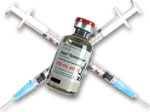Anabolic Steroids
Can Steroid Abuse Be Fatal?

In some rare cases yes. When steroids enter the body, they go to different organs and muscles. Steroids are not friendly to the heart. In rare cases steroid abuse can create a situation where the body may be susceptible to heart attacks and strokes, which can be fatal. Here's how: Steroid use can lead to a condition called atherosclerosis, which causes fat deposits inside arteries to disrupt blood flow. When blood flow to the heart is blocked, a heart attack can occur. If blood flow to the brain is blocked, a stroke can result. [1]
Bulking up the artificial way—by using steroids—puts teens at risk for more than cardiovascular disease. Steroids can weaken the immune system, which is what helps the body fight against germs and disease. That means that illnesses and diseases have an easy target in someone who is abusing steroids. [5]
In addition, people who inject anabolic steroids may share non-sterile "works," or drug injection equipment, that can spread life-threatening viral infections such as HIV/AIDS or hepatitis, which causes serious damage to the liver.
Are Anabolic Steroids Addictive?
It is possible that some steroid abusers may become addicted to the drugs, as evidenced by their continued use in spite of physical problems and negative effects on social relationships. Also, they spend large amounts of time and money obtaining the drugs and, when they stop using them, they experience withdrawal symptoms such as depression, mood swings, fatigue, restlessness, loss of appetite, insomnia, reduced sex drive, and the desire to take more steroids. The most dangerous of the withdrawal symptoms is depression, because it sometimes leads to suicide attempts. Untreated, some depressive symptoms associated with anabolic steroid withdrawal have been known to persist for a year or more after the abuser stops taking the drugs. [1]
What Can Be Done to Prevent Steroid Abuse?
Research has shown that there is an effective program for preventing steroid abuse among players on high school sports teams. In the ATLAS (for guys) and ATHENA (for girls) programs, coaches and sports team leaders discuss the potential effects of anabolic steroids and other illicit drugs on immediate sports performance, and they teach how to refuse offers of drugs. They also discuss how strength training and proper nutrition can help adolescents build their bodies without the use of steroids. Later, special trainers teach the players proper weightlifting techniques. An ongoing series of studies has shown that this multi-component, team-centered approach reduces new steroid abuse by 50 percent and, at the same time, produces the kind of athletic performance that the teen desires. [1]
What Is the Bottom Line?
The bottom line is: Science proves that there are serious risks associated with the abuse of steroids and teens should never use anabolic steroids to help them bulk up.
References
| 1. |
National Institute on Drug Abuse. NIDA Research Report-Steroid Abuse and Addiction (http://www.drugabuse.gov/ResearchReports/Steroids/AnabolicSteroids.html): NIH Pub. No. 00-3721. Bethesda, MD: NIDA, NIH, DHHS. Printed 1991. Reprinted 1994, 1996. Revised September 2006. Retrieved May 2009. |
| 2. |
National Institute on Drug Abuse. Commonly Abused Drugs Chart (http://www.drugabuse.gov/DrugPages/DrugsofAbuse.html): Bethesda, MD: NIDA, NIH, DHHS, 2000. Retrieved May 2009. |
| 3. |
National Institute on Drug Abuse. NIDA InfoFacts: Steroids (Anabolic-Androgenic) (http://www.drugabuse.gov/Infofax/steroids.html): Bethesda, MD: NIDA, NIH, DHHS. Revised June 2008. Retrieved May 2009. |
| 4. |
National Institute on Drug Abuse. NIDA InfoFacts: High School and Youth Trends (http://www.drugabuse.gov/Infofax/HSYouthtrends.html): Bethesda, MD: NIDA, NIH, DHHS. Revised December 2008. Retrieved May 2009. |
| 5. |
National Institute on Drug Abuse. Mind Over Matter: The Brain's Response to Steroids (http://teens.drugabuse.gov/mom/mom_ster1.php): NIH Pub. No. 00-3858. Bethesda, MD: NIDA, NIH, DHHS. Printed 1997. Reprinted 1998, 2000. Revised December 2008. Retrieved May 2009. |
| 6. |
National Institute on Drug Abuse. Mind Over Matter: The Brain's Response to Drugs Teacher's Guide (http://teens.drugabuse.gov/mom/tg_intro.php): NIH Pub. No. 020-3592. Bethesda, MD: NIDA, NIH, DHHS. Printed 1997. Reprinted 1998, 2002. Revised 2000. Retrieved May 2009. |
| 7. |
Pope, H.G., Jr.; Kouri, E.M.; and Hudson, J.I. Effects of supraphysiologic doses of testosterone on mood and aggression in normal men: A randomized controlled trial. Archives of General Psychiatry 57(2):133-140, 2000. |
Search.
Enter your keywords and click the button to submit the search.Need Treatment
Glossary
The Sara Bellum Blog
Free Downloads
Exercise your brain
Mind Over Matter


